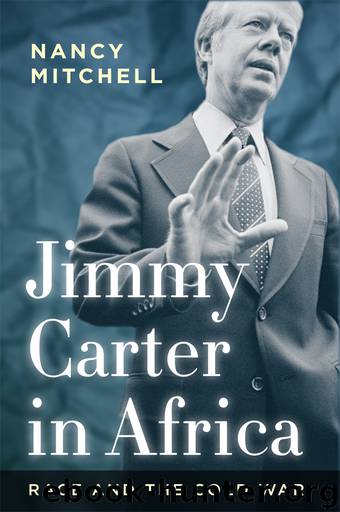Jimmy Carter in Africa by Mitchell Nancy

Author:Mitchell, Nancy [Mitchell, Nancy]
Language: eng
Format: epub
Publisher: Stanford University Press
Published: 2016-04-06T04:00:00+00:00
10. The War at Home
The boil had been lanced. Pressure had been building on Jimmy Carter—stoked by Brzezinski, conservatives in the United States, and leaders in Europe, the Middle East, and Asia—to stand up to the Cubans and Soviets, to stop being a wimp, to be a man, to do something. Carter had succumbed. He had lashed out against the Cuban “mercenaries” and declared Castro a liar. He had stopped the talk of normalization with Cuba. He had launched a “military operation”—his first—in Zaire.
Many at home and abroad applauded the president’s display of toughness and wanted more, complaining that the administration should have done more to help Mobutu and halted the SALT talks to punish Moscow. Others, including some of the administration’s allies in Congress as well as its newfound friends in Africa, were alarmed and feared that the enigmatic Jimmy Carter was revealing his true colors as a hardline cold warrior.
The African continent had claimed a great deal of attention in the early months of 1978, but by June, the war in the Horn was over (although skirmishes began anew in the Ogaden); Shaba was under control; and the administration was attempting to conduct its southern African diplomacy more quietly. The effect was immediate: Africa fell from the front pages and from the public’s consciousness. In the first six months of 1978, Carter was asked seventeen questions about Africa at news conferences; in the following six months, he was asked only one.1 From January through June 1978, stories about Africa appeared on the front page of the New York Times 150 times; from July through December, only 25 times. On the three nightly news broadcasts, Africa was mentioned 221 times from January through June but only 59 times for the rest of the year. After the turmoil of the first half of the year, the Carter administration returned to focus on the issue that had gripped it from its earliest days: southern Africa.
Stasis and War
The reverberations of Ian Smith’s internal settlement rumbled through the remainder of 1978. As the Salisbury Four—Smith, Bishop Abel Muzorewa, Reverend Ndabaningi Sithole, and Chief Jeremiah Chirau—worked out the details of the government they planned to create, they had no interest in pursuing the Anglo-American proposals. These proposals, formally announced in September 1977, had three basic provisions: (1) a cease-fire, after which Smith would step down and a British commissioner would take charge for a transitional period; (2) a constitution that would guarantee equal rights for all; and (3) internationally supervised elections to select the leader of an independent Zimbabwe. All three aspects required negotiations among all parties—Smith and his three black associates as well as the Patriotic Front. But the Salisbury Four refused to attend the all-party talks that were the sine qua non of the Anglo-American proposals. They told the Anglo-American negotiating team of Ambassadors Graham and Low that merely asking them to attend another conference to discuss the proposals was “an insult.”2
The internal settlement created almost insuperable barriers to the implementation of
Download
This site does not store any files on its server. We only index and link to content provided by other sites. Please contact the content providers to delete copyright contents if any and email us, we'll remove relevant links or contents immediately.
| Anthropology | Archaeology |
| Philosophy | Politics & Government |
| Social Sciences | Sociology |
| Women's Studies |
The Secret History by Donna Tartt(19092)
The Social Justice Warrior Handbook by Lisa De Pasquale(12191)
Thirteen Reasons Why by Jay Asher(8912)
This Is How You Lose Her by Junot Diaz(6889)
Weapons of Math Destruction by Cathy O'Neil(6281)
Zero to One by Peter Thiel(5802)
Beartown by Fredrik Backman(5756)
The Myth of the Strong Leader by Archie Brown(5509)
The Fire Next Time by James Baldwin(5447)
How Democracies Die by Steven Levitsky & Daniel Ziblatt(5219)
Promise Me, Dad by Joe Biden(5154)
Stone's Rules by Roger Stone(5088)
A Higher Loyalty: Truth, Lies, and Leadership by James Comey(4964)
100 Deadly Skills by Clint Emerson(4926)
Rise and Kill First by Ronen Bergman(4790)
Secrecy World by Jake Bernstein(4753)
The David Icke Guide to the Global Conspiracy (and how to end it) by David Icke(4720)
The Farm by Tom Rob Smith(4514)
The Doomsday Machine by Daniel Ellsberg(4490)
